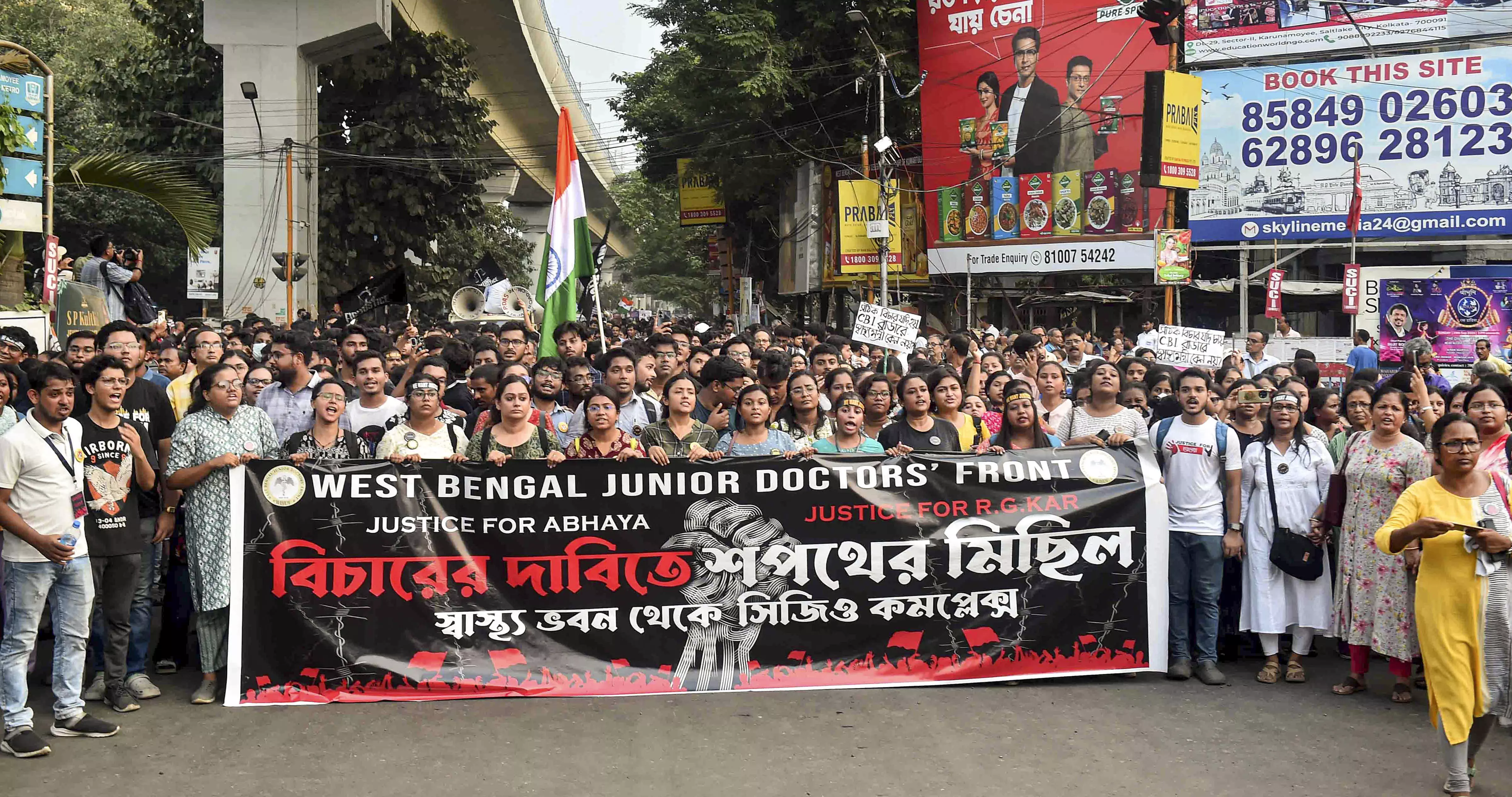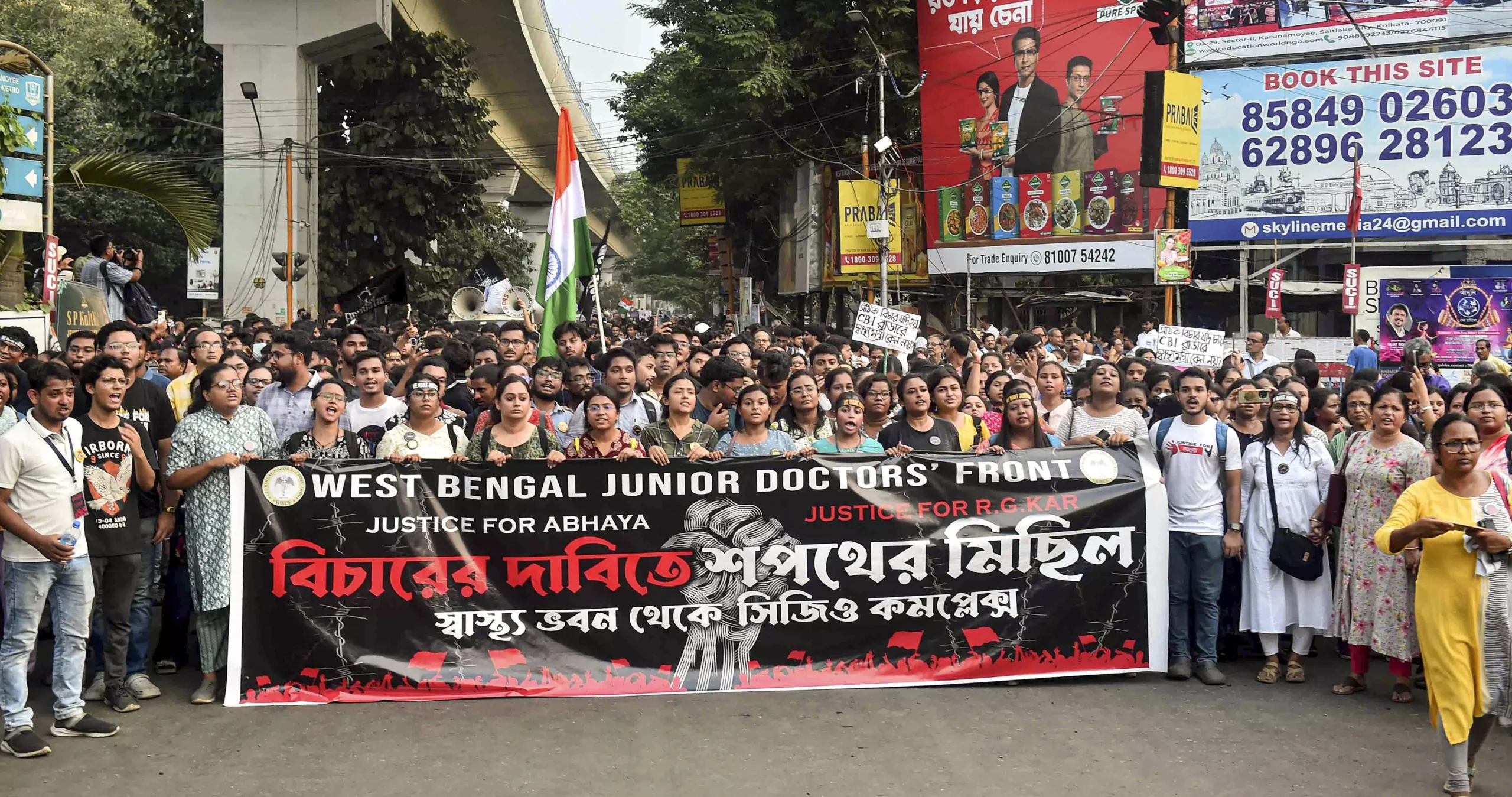
On September 20, the doctors at Kolkata’s R.G. Kar Medical College and Hospital, who had been on strike for well over a month, protesting against the horrific rape and murder of a 31-year-old doctor trainee within the hospital premises on August 9, announced a partial withdrawal of their agitation as a majority of their demands had been met by the West Bengal government. However, they will not work in the Outpatient
Department (OPD) but only in the emergency and essential services.
West Bengal chief minister Mamata Banerjee, senior police officers and the R.G Kar administration have been under heavy fire over the incident. As the situation worsened, the Supreme Court stepped in, asking the doctors to return to work, but they did not. The ongoing demands and discussions of the strikers are about effective security measures in hospitals, while there is an overhaul of the public healthcare delivery mechanism — including the streamlining of the referral system, appointment of health workers and professional patient counsellors, the plugging of admission corruption, and ensuring availability of life-saving drugs. All these needed changes.
During this time, thousands of OPD and some surgery patients have suffered, as only senior doctors and emergency services were in place. According to state government data, of the 70,000 patients seen in government hospitals, the number was down to half. The scheduled surgeries were down to 150 from 400-500 daily. There clearly is suffering.
What are the ethical aspects of such a strike? Are they justified? A strike is designed to be disruptive and creates substantial ethical tensions, mostly patient harm. Maika Davies, writing
on the ethical aspects of strikes by medical professionals around the world, noted that in 2015 the UK General Medical Council said that doctors contemplating industrial action must make sure that arrangements are in place to care for their patients and not put them at risk. In India, in response to strike action by doctors in 2010, the Delhi Medical Council said that under no circumstances doctors should resort to strike as it puts patient care in serious jeopardy.
Despite this, doctors in India have repeatedly engaged in strike action, including a nationwide strike in June 2012. Researchers at the Lokmanya Tilak Municipal Medical College in Mumbai recommend that a strike must be a last resort and said that for doctors, patients were of the highest importance. But people must not forget that doctors are also human beings, with a life, family, responsibilities, and bills to pay. Human dignity and respect must be preserved by a doctor towards a patient, and a patient towards the doctor.
In recent times, there have been reported attacks against doctors and nurses as patients and their families, dissatisfied with the care they are receiving, are abusive, and even violent. In a study by the Indian Medical Association (IMA), over 75 per cent of doctors faced violence of some
kind in the workplace, mostly from patients’ relatives. After the August 9 incident, the Indian Medical Association asked Union health minister J.P. Nadda to introduce a special Central law to prevent violence against doctors and to designate hospitals as safe zones.
Will more stringent laws help? In April 2020, India introduced a law that recognised violence against healthcare service personnel as a cognisable and non-bailable offence. But like many laws in India, it didn’t make an impact due to its unenforceability and the long arm of the law.
India’s public health system is poorly funded, with improper management due to limited resources and staff, poor training of medical staff, and high healthcare costs. According to government data, there are 3.4 million registered nurses and 1.3 million allied and healthcare professionals, including doctors, in the country. The Indian Journal of Public Health says that at least two million doctors will be needed by 2030. Families often go into debt to pay healthcare costs.
Anger and violence against doctors can also be because of inadequate communication skills, or what is called a “bedside manner” in medical parlance, to deal with difficult situations, especially for young resident doctors. Verbal abuse escalates when patients and their relatives are anxious about finances and the treatment of the patient, and young residents are not always trained to handle it.
Are strikes justified? Strike action has long been debated in the bioethics literature. Discussions have been passionate and polarised. Despite this, there is still little consensus on whether strike action is justified, and if so, how we justify such action.
Justified or not, Kolkata’s striking doctors must ask themselves if their legitimate demands can be met, when, and how. Sacking and replacing high-level officials can be the easy thing to do but may not be effective eventually. Checking the corruption and inefficiency of institutions is
another ballgame. The agitating doctors’ demands, while genuine, need to be better thought out, with a timeline and discussions outside the atmosphere of a strike.
Unfortunately, it takes a strike for the government to take note of the inefficiency and corruption in the system and for the doctors to resort to a strike to have their needs and concerns heeded and met. While the agitation is still on, the striking doctors must consider going back fully to work, where no punitive action will be taken against them as they are government employees.
The strike, CCTV cameras or security systems may not ensure the safety that the doctors are looking for. Making change is a slow business and a strike makes a mockery of such a process. It’s unethical and not justified.
